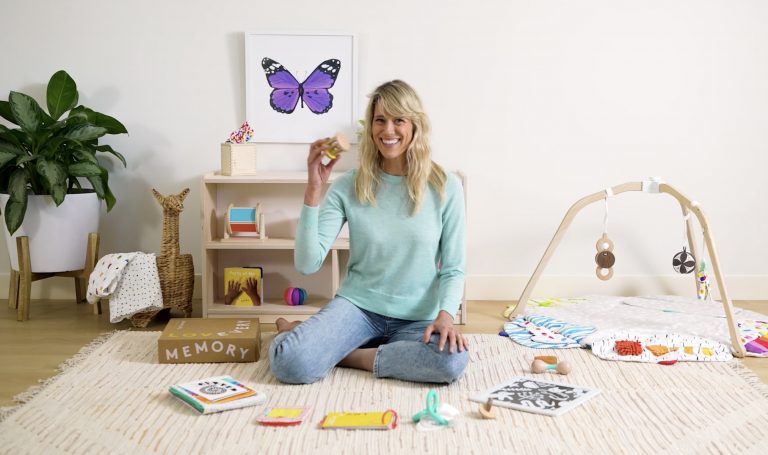8 tips for talking to your baby who doesn’t talk back yet

In the first few months, your baby is constantly listening to the intonation, rhythm, and patterns of your voice. Even though she can’t understand what you’re saying yet, her brain is laying the groundwork for acquiring language.
It can feel awkward to talk to someone who doesn’t talk back yet, but the research shows us that there’s a direct link between a child’s intelligence and the number of words spoken to her. Here are some tips for talking:
- When your baby is awake, facing forward if possible in a wrap, or head turned to the side in a carrier, walk around your house or outside (eyes protected from the bright sun) and talk about what you are seeing and experiencing. “House tours” will be a favorite activity for the first year.
- Make eye contact and respond to her cues. If she makes a vocalization or a coo, talk back to her. “Serve and return” communication is a well-studied ingredient for a child’s developing brain.
- Sing to your baby, even if you don’t think you have a great voice – your baby will love it because it is you. Babies tune into singing even more than talking.
- Talk aloud to your baby about what you’re doing and what she’s doing – narrate your day. Talk face to face during diaper time.

- Here is a great position for reading to a newborn baby. Your baby will take more interest in the book you are reading if she can see your face too. Plus, it helps to support awkward slumpy little bodies with your legs.
- Talk in the slower, high, sing-songy voice that is instinctual when speaking to babies. Research shows that speaking in a sing-song voice helps babies begin to access language, and the higher pitch is easier for babies to hear. The stretched out vowels help baby start to hear the sounds and rhythms of language.
- Tell grandparents, partner, caregivers how important talking is to your baby’s developing brain. Encourage them to find ways to talk to your baby.
- You don’t have to drive yourself crazy trying to talk constantly—just 15 minutes per waking hour can make a big difference.
Keep reading


3 - 4 Months
Welcome to The Charmer Play Kit for months 3-4
Watch Lovevery CEO Jessica Rolph introduce the Charmer Play Kit for months 3 and 4 of your baby's life.

3 - 4 Months
Week 13: Reach, grasp, mouth, repeat
Learn when your baby should start reaching, grasping, and mouthing objects—practices that build fine motor skills and hand-eye coordination.

3 - 4 Months
Week 14: Why the floor is the best place for your baby to play
Experts recommend your baby spend more time playing on the floor and less time in seats, swings, and strollers. Floor time builds core muscle and neck strength.
